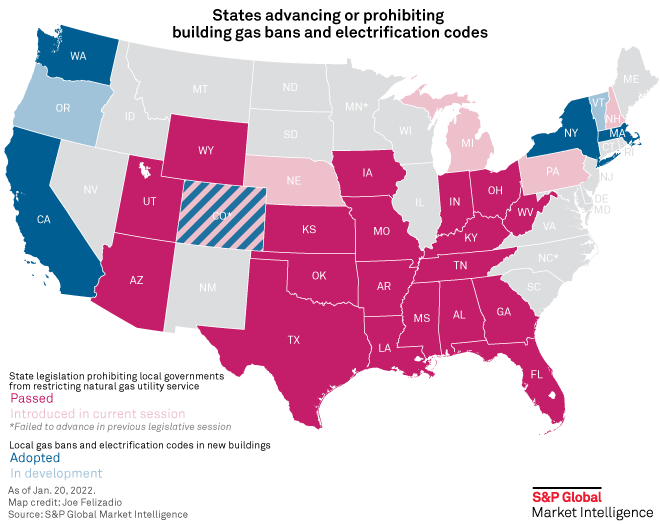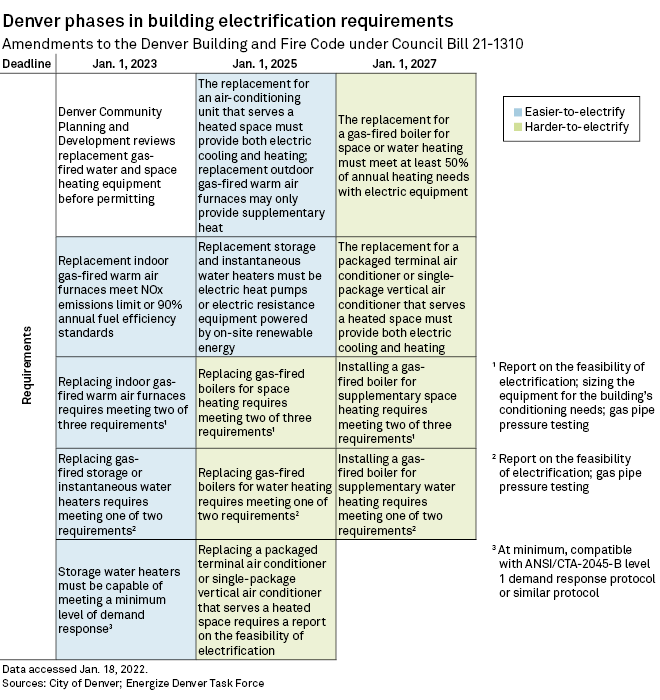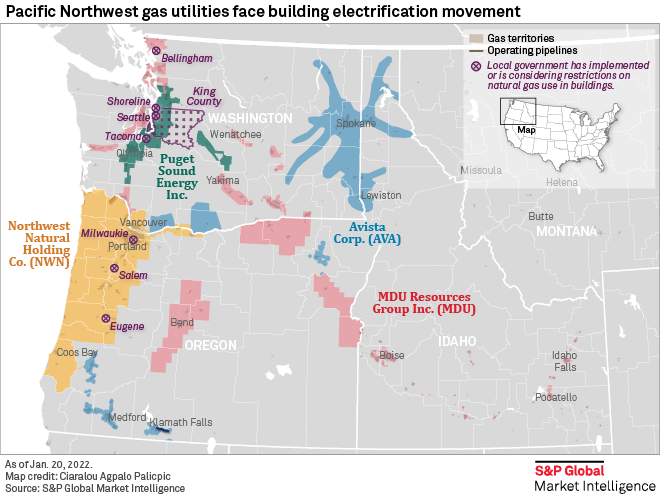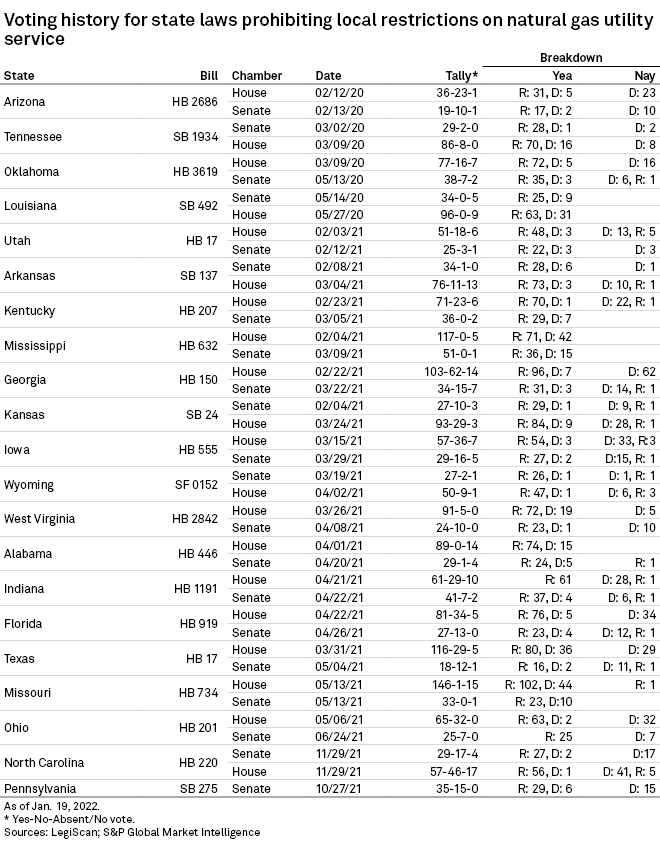S&P Global Offerings
Featured Topics
Featured Products
Events
S&P Global Offerings
Featured Topics
Featured Products
Events
S&P Global Offerings
Featured Topics
Featured Products
Events
Banking & Capital Markets
Economy & Finance
Energy Transition & Sustainability
Technology & Innovation
Podcasts & Newsletters
Banking & Capital Markets
Economy & Finance
Energy Transition & Sustainability
Technology & Innovation
Podcasts & Newsletters
S&P Global Offerings
Featured Topics
Featured Products
Events
24 Jan, 2022

| Bellingham, Wash., is one of several Pacific Northwest cities seeking to restrict natural gas use in new buildings. |
The end of 2021 brought a flurry of building electrification policymaking that carried over into 2022 and signaled continued headwinds for natural gas utilities in parts of the U.S.
While a building gas ban in New York City dominated building electrification news in December 2021, Denver and cities in the Pacific Northwest expanded gas restrictions in the Western U.S. Meanwhile, a legislative push to prohibit local gas bans slowed after at least 15 states adopted laws preempting building electrification mandates in 2021.

The new year has also seen Massachusetts lawmakers advance legislation to authorize local governments to restrict gas use in buildings, which could resolve the Bay State's policy impasse. Likewise, the Vermont legislature started the process of granting Burlington, Vt., permission to spur electrification through a carbon emissions fee on new buildings.
However, building electrification backers suffered a setback at the federal level, as President Joe Biden conceded that Democrats' massive climate and social spending bill would have to pass piecemeal. The party's failure to reach a deal on Build Back Better legislation put in jeopardy billions of dollars in proposed spending to support building electrification and efficiency.
Denver to electrify existing building stock
Denver took the pole position among U.S. cities seeking to electrify existing buildings with the passage of an ordinance that will phase out gas use in commercial and multifamily buildings in the coming years.
The Denver City Council on Nov. 22, 2021, adopted an ordinance that will require building owners to meet new energy performance targets and replace gas-fired space and water heating equipment with an electric system at the end of its useful life. While policymakers around the U.S. have considered mandating the switch to electric systems at the time of replacement, Denver is the first major city to adopt the strategy.
According to the city, the policies will drive an 80% reduction through 2040 from Denver's commercial and multifamily buildings, which accounted for 49% of citywide greenhouse gas emissions. The ordinance stems from recommendations by the Energize Denver Task Force, composed of representatives from gas and electric utility provider Xcel Energy Inc., the oil and gas industry, the building sector and labor and clean energy groups.
In setting the phased electrification requirements, the ordinance first seeks to even the playing field by changing permitting policies that make it more onerous to secure a permit for an electric heat pump. It then establishes requirements to replace easier-to-electrify space and water heating systems in earlier implementation years, followed by mandates to swap out harder-to-electrify systems.

Along the way, building owners who opt for new fossil fuel heating systems would face additional requirements, such as submitting a report to Denver's Department of Community Planning and Development outlining the feasibility of going electric instead.
Owners can apply for exemptions for emergency replacements and economic hardship, though in some cases, the city will not grant an economic hardship exemption if the cost of switching from gas to electric heating systems is within 5%-15% of a gas system replacement.
The performance targets will apply to buildings larger than 25,000 square feet and will require energy use intensity reductions by 2024, 2027 and 2030. The Office of Climate Action, Sustainability and Resiliency will set the targets based on building type and the building's 2019 baseline energy use intensity.
Pacific Northwest electrification movement expands
The Pacific Northwest building electrification movement gathered momentum as several cities translated intention into action.
Shoreline, Wash., became the first city in Washington to follow Seattle's model for blocking natural gas use in new commercial and multifamily buildings. The Shoreline City Council on Dec. 6, 2021, voted unanimously to adopt Ordinance 948, which updates the energy code to prohibit fossil fuel combustion for most space and water heating.
The updates also included requirements to install solar photovoltaic panels on new buildings and large additions and to provide wiring for easy conversion from gas appliances to electric alternatives. The ordinance incorporated the 2018 Washington state commercial energy code update, which Seattle amended to essentially require electric heating systems, with exceptions. The code does not apply to small, single-family residences.

One week later, the Bellingham City Council unanimously passed a motion to hold work sessions focused on adopting a similar measure. All seven council members also supported a resolution directing the city's climate committee to explore potential job dislocations resulting from decarbonization policies and to consider developing a workforce proposal that would facilitate a just transition.
During the Dec. 13, 2021, meeting, the proposed ordinance drew opposition and concern from building and real estate associations, labor representatives and the city's gas distributor, MDU Resources Group Inc. subsidiary Cascade Natural Gas Corp. Puget Sound Energy Inc., which provides electric utility service in Bellingham, Wash., and distributes gas in Seattle and Shoreline, also came out against the ordinance.
The legislative activity, along with a proposal to require all-electric commercial and multifamily construction in the 2021 Washington Energy Code, indicates an emerging network of building restrictions that gas utility operators like Northwest Natural Holding Co. have sought to forestall. Compounding concerns for regional gas distributors, policy momentum also gathered in Oregon in recent months.
Following the Eugene City Council's resolution to explore building electrification mandates, local lawmakers in Milwaukie, Ore., workshopped a similar plan. Milwaukie Mayor Mark Gamba shared a draft resolution directing the city attorney to schedule work sessions to develop residential, commercial and industrial building electrification requirements that would go into effect in February 2024.
Milwaukie's resolution would also seek a roadmap for electrifying existing buildings by 2035 and proposed requiring all-electric construction and renovation of city buildings when projects top $50,000.
Preemption bill hits snag in North Carolina, legislation advances elsewhere
North Carolina Gov. Roy Cooper on Dec. 9, 2021, became the first state executive to veto legislation to preempt local gas bans, abruptly ending the House Bill 220's progress. Cooper said the legislation "undermines North Carolina's transition to a clean energy economy" and "wrongly strips local authority."
The bill initially attracted enough state House votes to override a veto, but a state Senate-amended version lost the support of several Democrats and Republicans in the lower chamber. The lawmakers balked at the Senate's inclusion of a divisive provision that would limit access to public information on critical infrastructure, environmentalists who followed the process told S&P Global Market Intelligence.
Lawmakers are likely to revive the legislation in the legislature's so-called short session, which convenes in May, according to Brooks Rainey Pearson, legislative counsel at the Southern Environmental Law Center. Pearson said in an interview that she expects Freedom Caucus members and Republicans who had opposed the bill to close ranks with GOP colleagues, provided they drop the controversial public information amendment.

The effort to preempt local gas bans spread to New England, where New Hampshire Rep. Fred Plett introduced House Bill 1148 on Jan. 5. The bill would prevent a county or local government from enforcing any ordinance, regulation, code or policy that would restrict or prohibit customer access to fuel sources. It would apply retroactively to existing measures. HB 1148 is currently in the Committee on Science, Technology and Energy.
In Nebraska, Republican Sen. Joni Albrecht introduced Legislature Bill 1008, which would reinforce a gas ban firewall across much of the central and southern U.S. The bill would prevent a county, city, or village from implementing an ordinance, resolution, regulation or policy that would prohibit connection to utility service based on the fuel source. The Nebraska Legislature, which has only one chamber, referred the bill to the body's Government, Military and Veterans Affairs Committee.
Preemption bills introduced in 2021 remain under consideration in the Pennsylvania and Michigan legislatures, which both hold two-year legislative sessions.
In New Jersey, the bipartisan Senate Bill 4133 would have prevented state agencies from requiring electric space and water heating until Gov. Phil Murphy's administration vets the policy. Maximizing building electrification is core to Murphy's Energy Master Plan.
The legislation would have required agencies to hold at least six stakeholder meetings and file a report on issues including electrification costs, ratepayer impacts and the potential to decarbonize buildings using low-carbon fuels. The bill passed the Senate on a 35-3 vote on Jan. 10. However, it did not get a vote in the state Assembly and cannot carry over into the 2022 session.
